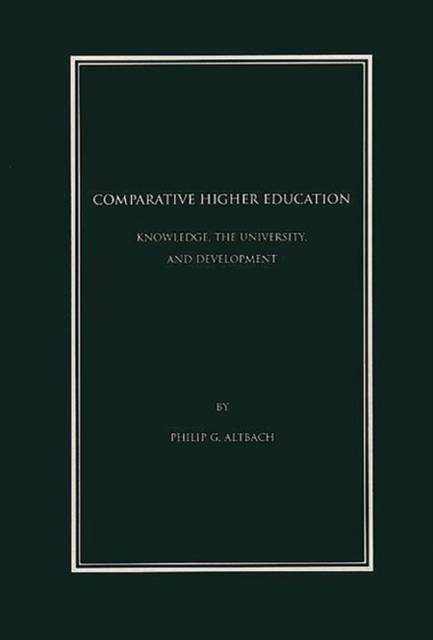
Bedankt voor het vertrouwen het afgelopen jaar! Om jou te bedanken bieden we GRATIS verzending (in België) aan op alles gedurende de hele maand januari.
- Afhalen na 1 uur in een winkel met voorraad
- Gratis thuislevering in België vanaf € 30
- Ruim aanbod met 7 miljoen producten
Bedankt voor het vertrouwen het afgelopen jaar! Om jou te bedanken bieden we GRATIS verzending (in België) aan op alles gedurende de hele maand januari.
- Afhalen na 1 uur in een winkel met voorraad
- Gratis thuislevering in België vanaf € 30
- Ruim aanbod met 7 miljoen producten
Zoeken
€ 127,45
+ 254 punten
Uitvoering
Omschrijving
Higher education is increasingly international. The issues that affect universities in one country are important globally. There are a myriad of links among academic systems worldwide. Comparative Higher Education is the first book to systematically explore many of the most important implications of the globalization of higher education. It explores the links among universities, including foreign students and scholars, the impact of the Western higher education idea on universities throughout the world, and especially the current importance of American academic ideas worldwide, and the patterns of inequality among academic systems. Teachers and students are at the heart of the academic systems. Comparative Higher Education focuses on professors and students-especially the political involvement of both professors and students-and seeks to understand their roles in a comparative framework. The book concludes with a discussion of higher education development in the newly industrializing countries. These Pacific Rim nations are examples of how higher education has been used in the process of development. Comparative Higher Education reflects more than three decades of research in the field, and places key elements in the globalization of higher education in a useful framework. Worldwide examples are used to illustrate analyses of such key topics as international exchange, future trends in university development, the complex relationships among academic systems in the industrialized and developing countries, and related issues.
Specificaties
Betrokkenen
- Auteur(s):
- Uitgeverij:
Inhoud
- Aantal bladzijden:
- 278
- Taal:
- Engels
- Reeks:
Eigenschappen
- Productcode (EAN):
- 9781567503807
- Verschijningsdatum:
- 20/04/1998
- Uitvoering:
- Hardcover
- Formaat:
- Genaaid
- Afmetingen:
- 161 mm x 235 mm
- Gewicht:
- 530 g

Alleen bij Standaard Boekhandel
+ 254 punten op je klantenkaart van Standaard Boekhandel
Beoordelingen
We publiceren alleen reviews die voldoen aan de voorwaarden voor reviews. Bekijk onze voorwaarden voor reviews.









